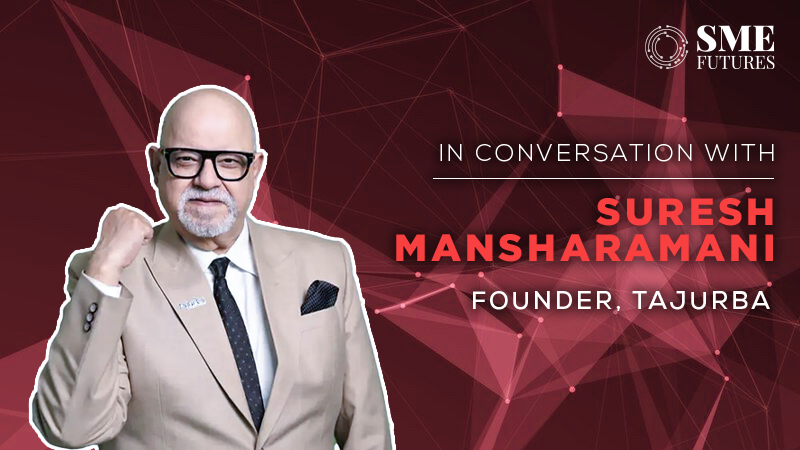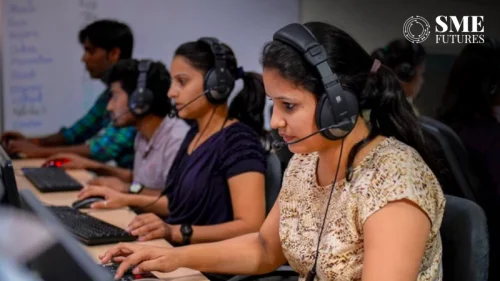In 2023, the Indian SME sector witnessed a whopping 179 SME IPOs take centre stage, strutting their stuff and dazzling investors. But wait, it gets even better – 156 of these IPOs smashed records, raising a jaw-dropping Rs 4,200 crores. That’s not just money; it’s rocket fuel for these ambitious MSMEs, propelling them to new heights!
The number of SME IPOs in 2024 is already over 130. Entrepreneurs, armed with innovative ideas and relentless determination, are turning their visions into reality faster than you can say “IPO.”
With this surge in SME IPOs, wealth creation is off the charts. MSMEs are transforming into powerhouses, attracting investors like bees to honey. And the impact? It’s a tidal wave of growth, sweeping across the nation, boosting the economy, and creating opportunities.
This is what the IPO boom is and Tajurba, India’s growing business network and MSMEs are on a mission to empower 500 Indian MSMEs to launch their IPOs within the next five years. “India is experiencing rapid growth, presenting numerous opportunities that need to be tapped by the MSME sector. With my experience and support, I will assist them in scaling their businesses and ensure their successful IPO launches,” says Suresh Mansharamani, Founder & CEO, Tajurba.
SME Futures had a one-on-one talk with him to understand the current state of SMEs and how IPOs can transform them into economic success stories.
Here are the edited excerpts:
Could you start by telling us a bit about your background and what inspired you to start Tajurba?
I am the Founder of Tajurba, a thriving community of SMEs and MSMEs in India, boasting of over 1 lakh members. My mission is to skill, coach, and help them scale their businesses, achieving three to five times more profit than the industry average. Additionally, I guide them in listing on the SME exchange, enabling them to attain respectable valuations.
At 67 years old, I’ve authored seven books and am a three-time TEDx speaker. My expertise lies in Objective Key Results (OKRs), the world’s leading goal management system used by giants like Google and Amazon. Uniquely, I apply this system to small businesses in India. This is my passion and what I do.
I started my career with an apparel export company, earning just 300 rupees. For two years, I learned everything about apparel export. In 1995, my company became one of India’s largest apparel exporters, eventually getting listed on the Bombay Stock Exchange with an IPO oversubscribed by 300 times. We also received the Presidential Award and a Certificate of Merit from Dr. Shankar Dayal Sharma at Vigyan Bhavan.
However, in 2001, we faced a major setback, suffering heavy losses that forced us to sell our factories, bungalows, and even our publicly listed company. We made the mistake of relying heavily on two major US customers, who provided 80-90 per cent of our business. Without a mentor or business coach to guide us, we learned everything by doing, failing, and learning. Unfortunately, when both customers went bankrupt following the 9/11 episode, we lost a significant amount of money. To bounce back, I delved into business coaching, earning certifications in Gallup, life coaching, and OKRs. I then began integrating those I trained into a continuous support community.
This community provides ongoing peer-to-peer learning, my coaching and training, and a network for business opportunities. We even developed an app to facilitate lead generation within the community. Our vision is to grow this community to 10 million MSMEs in India, creating a self-sustaining ecosystem where members can find and provide goods and services to each other.
My Big Hairy Audacious Goal (BHAG) is to help 500 SMEs get listed on the SME exchange and achieve million-dollar valuations. So, I focus on two major goals: building a community of 10 million MSMEs and creating 500 billionaire SMEs.
How do you see MSMEs right now? How have they evolved over the years with everything that’s been going on?
MSMEs need a lot of handholding and skill development. They are often in a constant state of firefighting, facing a lack of funds, skills, and manpower. Out of the 6-7 crore MSMEs in India, only 900 have been able to get listed. And out of those 900, only 40-50 per cent are truly successful and able to properly utilise their funds to scale up.
There’s a significant gap in the skills needed to scale up and understand how large businesses operate and perform. Without mentoring, they often create financial messes, lack financial discipline, and maintain a mindset focused on avoiding taxes, which harms their valuation. I always tell them, if you’re saving one crore rupees in taxes, you’re losing Rs 50 crores in valuation. It’s crucial to pay your taxes, keep your balance sheet clean, and avoid shady transactions. They need to look at capital markets, comply with regulations, and uphold good corporate governance. This is a major challenge for the MSME sector and a task I see as vital.
Are you saying that IPOs are going to be a saviour, a game-changer for MSMEs?
Absolutely, IPOs are already proving to be a game-changer. If you study companies that listed in the last year or two, you’ll see that some have gone from a 40-crore valuation to 500 or even 1000 crore valuations. Their profits and turnovers are doubling. This decade belongs to SMEs. When the SME exchange first opened, no one was interested in investing in them. Today, they are hotter investments than big companies and start-ups, with investors multiplying their money 4x, 5x, or even 10x in a year. Even their founders are seeing tremendous growth and opportunity.
So, how should SMEs approach IPOs? How can they determine the right time to launch an IPO?
There are two types of companies to consider. First, the IPO-ready companies with turnovers of 15 to 20 crores and a profit after tax of 2 to 3 crores. These companies have clean balance sheets, are private limited, and maintain financial hygiene. They could be ready for an IPO in the next 3-6 months.
Second, there are companies at a similar turnover level but with messy balance sheets, incorrect tax payments, lots of related party transactions, and unscalable business models with low profitability. For these companies, it’s crucial to refine their business models, increase profitability, and create ‘blue oceans’ so that they can earn decent profits in the next year or two and then consider scaling up and getting listed.
The third category includes companies with turnovers between 2 and 5 crores. These companies may need another 2 to 3 years to scale up to the level where they can think about an IPO.
The biggest roadblock for many SMEs is their mindset. There is a fear that going public will bring too many compliances and reduce their freedom, requiring them to report to numerous shareholders. For example, businesses in regions like Surat are doing well but often operate through multiple companies to save on taxes. Despite being capable of going public, their fear of compliance, reporting to shareholders, and dealing with SEBI is holding them back, preventing them from realising their full potential.
You’ve mentioned that Tajurba is also planning for an IPO next year. How are you preparing for this?
We are growing rapidly. In 2020-2023, we saw 100 per cent revenue growth, and this year we are aiming for 300 per cent growth. We are heavily investing in marketing and technology to support this expansion. For the financial year 2024-25, our focus will be on profitability alongside growth. By 2025, we aim to be IPO-ready with a projected PAT of around 30 per cent, which is significantly higher than the industry average of 10-15 per cent. Our target date for the IPO is June 2025.
Also watch: Here’s how MSMEs are thriving
You’ve set an ambitious target of helping 500 companies launch their IPOs in the next five years. How is this progressing?
Among our Tajurba members, around 15 companies are currently preparing to launch their IPOs next year. We continuously filter and onboard new members, focusing on those who are IPO-ready. For example, this morning, I had a meeting with a jewellery company from Kota that is already doing Rs 30 crores in turnover. If everything goes well, they should have their IPO by December.
Our daily focus is on identifying potential IPO candidates and helping them prepare. I’m confident that through these efforts, we will achieve our goal of launching 500 IPOs. Additionally, I hope to be recognised with a prestigious award, such as a Padma Award, for our contributions to the MSME sector.
People are increasingly becoming leadership coaches and mentors. How do you see this sector evolving in India?
This sector is growing rapidly, which is great because people are now recognising the value of having a mentor, which was often overlooked previously. Today, more individuals are aware of how crucial mentorship can be. We’re seeing highly qualified and experienced mentors entering the market, providing substantial help to MSMEs and SMEs, and assisting them in scaling their businesses.
A robust ecosystem is developing, benefiting both learners and coaches. Learners are gaining valuable insights, while coaches are thriving in this space. I believe the future is very bright for this sector in India. We are just beginning to tap into the potential, especially in tier 2 and tier 3 cities.
To reach these underserved areas, I have started a free YouTube series every Wednesday called “0 to 0,” where I explain how to start a business with zero capital. This initiative aims to provide knowledge to those who might not have the means to pay for coaching or have access to professional mentors.
There are numerous associations related to different business sectors, when it comes to mentorship and education for businesses, do they have such organised platforms?
Not yet, but you’ve given me something to think about. Creating an association specifically for business mentorship and coaching is a great idea. With so many individuals offering advice and coaching services, it makes sense to have a structured platform to ensure quality and credibility. Absolutely, I think it’s a worthwhile initiative, and I will certainly work on it.
You’ve also given me a great idea about creating an association for business mentors. This could help standardise mentorship quality and provide a reliable platform for businesses seeking guidance. I’ll definitely consider working on this.











